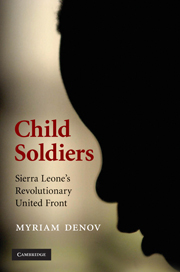Book contents
- Frontmatter
- Contents
- Acknowledgements
- Map
- Introduction: Child soldiers, iconography and the (il)logic of extremes
- 1 Children's involvement in war: The quandary of structure and agency
- 2 Recipe for rebellion: Civil war in Sierra Leone
- 3 Negotiating power: Research on and by child soldiers
- 4 ‘Becoming RUF’: The making of a child soldier
- 5 ‘Being RUF’: Victimization, participation and resistance
- 6 ‘Put dey gon don’: The unmaking of a child soldier
- 7 New battlefields
- References
- Index
1 - Children's involvement in war: The quandary of structure and agency
Published online by Cambridge University Press: 04 May 2010
- Frontmatter
- Contents
- Acknowledgements
- Map
- Introduction: Child soldiers, iconography and the (il)logic of extremes
- 1 Children's involvement in war: The quandary of structure and agency
- 2 Recipe for rebellion: Civil war in Sierra Leone
- 3 Negotiating power: Research on and by child soldiers
- 4 ‘Becoming RUF’: The making of a child soldier
- 5 ‘Being RUF’: Victimization, participation and resistance
- 6 ‘Put dey gon don’: The unmaking of a child soldier
- 7 New battlefields
- References
- Index
Summary
All warfare affects children, but there is mounting evidence that current conflicts are having a greater impact than ever before … African communities are increasingly … permeated by forces, relations and pressures … integrally related to globalization … Constrained by debt and structural adjustment programmes the economies of many developing countries have undergone restructuring which has involved cutting basic services and reducing the size of the public sector. Inequalities have widened and the effect on the social fabric has been to make livelihoods more insecure. Household and community capacities to nurture and protect are declining and there has been a weakening of the norms to protect children … This has resulted in the commodification of children … which is inducing an increase in child labour, including child soldiering.
(Maxted 2003, pp. 51–2, 65)Many under-age combatants choose to fight with their eyes open and defend their choice, sometimes proudly … [M]ilitia activity offers young people a chance to make their way in the world … As rational human actors, they have [a] surprisingly mature understanding of their predicament.
(Peters and Richards 1998, p. 183)While international concern and scholarly attention has increased about child soldiers and their seeming omnipresence within armed groups and forces, for the most part, children's involvement in armed conflict has tended to be explained by largely contrastive viewpoints.
- Type
- Chapter
- Information
- Child SoldiersSierra Leone's Revolutionary United Front, pp. 20 - 47Publisher: Cambridge University PressPrint publication year: 2010



